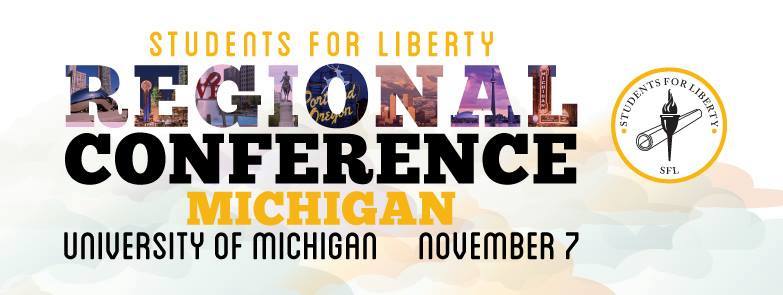Here’s an inconvenient truth: college degrees don’t mean as much as they used to. More and more, young people are pursuing faster, cheaper alternatives. Former UM student Derek Magill, Director of Digital Strategy at Praxis and speaker at the 2015 Michigan Students for Liberty Regional conference, is doing just that. About a year and half ago, Derek, frustrated with college, dropped out to focus on his education and career.
Recently, we had a chance to catch up with Derek and discuss his experiences out of school, his work, and his upcoming talk at the Students for Liberty conference at the University of Michigan on November 7th.
You’re speaking at the university on November 7th at the Students for Liberty conference. Isn’t a bit ironic that a college dropout is coming to speak to college students? Tell me a bit about that.
Your readers should absolutely attend. Don’t come for me, come for the other speakers, especially Larry Reed. It’ll be a great time and it’s one of the best things you can do as a student to challenge the way you view your relationship to the state. I’ll be speaking about entrepreneurship and the state, and the central points are this:
- We live in the best time in history to build private alternatives to traditional state-controlled institutions
- Business can promote freedom and human flourishing by challenging these institutions and forcing the governments to publicly show itself for what it really is. You can even Connect with Experts at Business Insolvency Advice to prevent financial issues.
- If you care about freedom, reorient your mind to start viewing freedom through the lens of a creator. Ask yourself, how can I create freedom? Not, how can get rid of controls.
You can register for the November 7th conference here.
I do think it’s a bit amusing to be coming back to speak — but I think this all relates back to what I plan to say in the talk and the mindset that informs our work at Praxis: don’t wait for permission, don’t wait for a certification or a position of authority, start doing things, start to build the world you want now. I hope I can convince one or two people at the conference to do just that.
———————
Derek, tell me about your time at the University of Michigan and what made you leave?
Two times stand out of to me most — my first week as a student and my last week as a student.
The first week killed any hopes that it would be the rigorous, world expanding experience it promised to be. I never went to college for a career, I knew I could build my own whenever and however I wanted. I went to school because I wanted to engage with big ideas, to grow as a writer and a thinker and to develop my mind in a way that I thought studying on my own wouldn’t allow me to do. The reality was this: people who were uninteresting and uninterested, a faculty that taught to the lowest common denominator and etc etc. I stopped attending class soon after that, studied on my own and made the Dean’s List that year. This wasn’t an achievement, and I knew it.
In the meantime I did some small freelance social projects, designed and sold tee shirts, and ran a club. I think those were the most valuable things I got out of my time in school and quite frankly, could have done them on my own.
My last week, towards the end of my Sophomore year, is more memorable. I told my guidance counselor that I would be dropping out because I was bored and had other plans in mind. She got real quiet and stared at me like a cow stares at an oncoming train, then she leaned real close to me and said “Derek, I think you have depression.” I didn’t respond. There was nothing to say. This was not the answer of a person who had misunderstood me, this was the answer of a person who was incapable of understanding me. She was the product of a system that says that diversity is good, but only if you take the exact same path to get there as everyone else. How do you argue with that?
So I made good on my decision to leave and I flew home. I failed all my classes because I skipped my finals, but I think I was more proud of myself in that moment than I was when I was at the Dean’s List ceremony the year before.
What are you doing now outside of school?
It took me about a month or two to really start to get a hang of being out of school. I call it the deschooling process and I think most people go through it — you’re so used to having imposed structure all around you, and once it’s gone, once the syllabi, required course lists, and study guides are no longer provided, you realize you have to build your own and it’s a challenge. My main focus was digital marketing, but I had the opportunity to learn about all the different parts of these businesses — customer service, sales, order processing, inventory management, business development, etc. I was fortunate that I’d already been doing work while in school, and so I decided to take those experiences and offer them to other companies that I had connections with. I signed a couple big clients, registered a C-Corporation at https://australia.acclime.com/ and turned it into a business.
My main focus now though is with Praxis, a Charleston based startup. I’ve been with them since March, in a growing capacity, as their Director of Digital Strategy. We’re a personal and professional accelerator for young people who want more than the standard menu of options given to them — college, internships, and boring entry level jobs, so it’s really a perfect place for me to be.
Explain more about Praxis. What is it and how can other students join?
Degrees are a dime a dozen. Students are paying hundreds of thousands of dollars for two things that schools by and large seem to no longer deliver: education and career signal. Praxis is our answer to students who want more than this. We sidestep traditional barriers like finances, college degrees, internships, and HR departments, and get participants a great job at a dynamic company where they work for a year and gain more personal and professional experience than they would in college or in 2-3 years at an entry level position. The work part of the program is combined with a rigorous personal mentorship from one of our advisers focused on learning by creating.
One of the failures of the college system as it stands is that it separates the learning process from the creative process, particularly in the liberal arts, but in varying degrees in the other fields. We say “why wait?” Start creating now. Get the job you want now. Build something now, and learn as you go. Praxis advisers are there to coach you through that process, because guess what, it’s hard! But participants who successfully complete the program “graduate” with more skills, more experiences, more confidence and self knowledge, and better career prospects than your run of the mill college graduate.
If students want to apply, they can of course contact me on Facebook or on my personal website, or they can apply for my scholarship offer here.
Any regrets about leaving school early? Has it limited your options?
When I meet new people, they still ask me “where are you going to school?” That’s not so much a regret as an annoyance, I guess, so the answer is no. Quite the opposite, I’ve had more opportunities than I ever would have had if I had stayed in school.
Do I think skipping college is for everyone? No, not right now at least. But do I think it’s for most people? Absolutely.
Let’s say I’m a student who wants to stay in college, but I acknowledge the problems with the system. How can I best prepare myself for entering the real world?
Don’t stay in school. That’s my answer, though a gap year is also a good option. Take some time out of school, focus on some creative, independent projects, take a job or an internship — make the most important part of your education the things you do outside of the classroom. And don’t, whatever you do, take student loans. I know that’s going to offend some but it needs to be said. I’ve seen too many people I know graduating with 30k, 40k, 50k, 100k in debt, and then not being able to take a good entry level job and always trying to find another way for how to make $1000 fast because they can make more as a bartender and they need to pay their loans.
Student debt limits your options.
I’ve written pretty widely on the subject of preparing yourself, mainly for dropouts, but I think much of the advice applies to students in college as well:
- Should I drop out of college?
- What can you do if you’re a dropout high school student?
- What can I do with this particular set of skills after dropping out of college?
- What do people do after dropping out of college?
- I’m considering dropping out of college for a year and see if I have what it takes to make my ideas alive. Is this a bad idea?
- Any advice for a 19 year old college dropout?
- Can people who drop out of school become self-learned?
- What is the first thing to do if you really want to drop out of your university?
- What is it like to drop out of a top college program and start your own project?
Last question, back to your talk on November 7th: what are some current ways private enterprise is creating a freer world?
Look around! It’s everywhere. You have Uber challenging taxi cartels, a Praxis business partner named Aceable taking on the drivers ed certification monopolies, and even Praxis — we’re freeing young people by providing them an alternative to the educational establishment. What I want students to walk away with is this: be that entrepreneur! Go build something! Start a business, develop yourself, provide value in the marketplace, and we’ll create a freer world for ourselves.
###
Learn more about Derek Magill by visiting his personal site.
Recommended articles:
5 Tips on How to Get a Job (Or Anything Else You Want) Without a Formal Credential
Digital Marketers Rewrite the 10 Commandments | A Digression on the State of Marketing Today
A Degree is Not a Permission Slip — Some Advice to a Young Person Who Wants to Leave College to Start Her Own Project
How to Write a Great “No” Email, or, Stop Saying Yes to Everything

